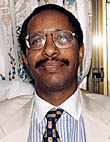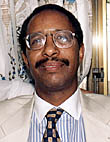
Osman Ahmed: “Yemen’s reform program has come a long way.” [Archives:1998/31/Business & Economy]
August 3 1998

Dr. Osman, who hails from neighboring Somalia, had his in the work. After all, Yemen as is close to home as he could get, for now. Osman established the World Bank’s office in Yemen. Over the last three years, he worked hard to bring the two sides closer. That he did, with spectacular results. Implementation of bank projects has improved visibly.
Dr. Abdulaziz Al-Saqqaf talked to him about various aspects of the Yemeni reform package implmented with the assistance of the World Bank and the IMF. He filed the following interview. Excerpts:
Q: Senior Yemeni officials speak very highly of you. Why?
A: Well, you tell me!
I leave Yemen with good feelings – both as a person and as a professional.
As a person I feel like I’ve come really close to the home I have not been to in a long time. I have never felt like a foreigner here. I have not been to Somalia, my home of origin, since the mid-1960s. Coming to Yemen is as close to home as it can be.
The professional part of my experience in Yemen consists of two components: One is the World Bank and the other is Yemen. The bank established this office of challenge in July, 1995, starting from scratch. Its aim is to help the Yemeni government achieve a better functioning economy. That is what the bank does. It provides support and advice to any country that needs our support and advice.
I am happy my experience has been a fruitful and pleasant one.
Q: How do you now evaluate relations between Yemen and the Bank?
A: Improving relations between the bank and Yemen is very important. Before my arrival, these relations were at best strained. There was no trust. People in the World Bank used to be dismissive of Yemen. The ideas and perceptions were negative, to say the least. We have successfully eliminated this.
Today, Yemen has become one of the most desired places to work in/with. I can honestly say that relations between the World Bank and Yemen have now become examplary.
Q: How do you feel about the reform package?
A: What has been done of the reform package is a tremendous success. However, it is not complete yet. There is more work to be done.
The government has adhered to the program in spite of all the difficulties. Sometimes we forget where we have been, and focus on where we are and look at what needs to be done. We say, ‘It is not enough’. But if we look back in terms of how far we have come, the picture becomes is indeed a positive one.
Q: The reforms are successful because the Bank and IMF pumped into the economy more than One Billion US Dollars over 3 years. Without this subsidy, do you think we will have a similarly glowing story?
A: I am not sure we have provided that much money. But, I do believe that the success of the stabilization part of the reform is due to the ability of the authorities to bite the bullet, so to speak.
Q: The numbers are right. But let me talk about the success you are talking about. I see no growth?
A: I said earlier that the work is not yet finished. The stabilization part has been done. Growth, on the other hand, has not started yet. It will partly depend on what else the government does. There are a few things being currently done that need to be completed.
I think the whole issue of land ownership and property rights is very important. People will have to feel secure in their property rights of ownership to want to put long-term assets into their company. The feeling of security has to be there. Because of the negative publicity, some people have become edgy and continue to hold negative perceptions. That is minor, however.
Q: What are the other issues that need to be completed?
A: The other important issue is how conflicts are resolved, how contracts are inforced and how disputes are adjudicated, etc. The judicial aspect is very important, which is not yet in place. What is coupled with that is the inforcement of court sentences and verdicts. The performance of the judicial system is very important for the unconnected foreign investors. If unconnected people can enjoy their rights under the law easily, then we can say that the environment is condusive to growth and investment.
Of course, another issue is administrative reform, which is very critical not only in its own right, but also to improve the functioning of the state. This would also enable it concentrate on its core responsibilities such as delivering better services to the public and to consume less.
It is also important to improve the interface between the public and the private sectors. Because if every time the private investor deals with the public sector problems are encountered, they he loses heart. So, that interface also has to be smooth, supportive and as inexpensive as possible. It should not increase the cost of the business.
Q: Many Yemenis have reservations regarding the integrity of the officials who are administering the reform program. What are your views on that?
A: Really new people and systems have to be there. But it is not the people, it is more the system. Even if you get new faces, they might slide into the same (corrupt) role.
The system that needs to be there must encourage efficiency, transparency and accountability. We need to change perceptions and motivations. There must be people who are really motivated and who also have a vision.
Q: Your advice to your friends and partners in Yemen?
A: Yemen has started many difficult processes – re-unification and cementing national cohesion, democratization, and economic reforms – all at the same time. That is a tall order.
My advice is that the greatest danger will be in back-sliding. Because if you back-slide, you may not be able to stop it.
That is really no option because, the road backward is closed. You must not stop. You have no choice but to move forward, and succeed at that.
In fact, the most difficult part is done. The next steps are difficult, but that is where the fruits are reaped.
Q: What do you take with you from Yemen?
A: I am taking lots of spiritual, cultural and intellectual values.
——
[archive-e:31-v:1998-y:1998-d:1998-08-03-p:./1998/iss31/b&e.htm]


